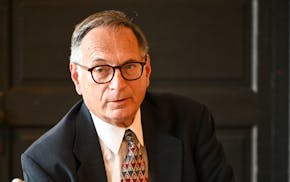From cops and doctors to patients and parents, the faces of the debate over medical marijuana in Minnesota make up the majority of a task force that will closely watch how the state's new law plays out.
Gov. Mark Dayton on Thursday named 16 appointees from throughout the state to the Task Force on Medical Cannabis Therapeutic Research, created as part of the bill passed in May that legalized some forms of medical marijuana. They were chosen from among 33 applicants. The Minnesota Department of Health is still seeking an administrator for the state's medical marijuana program.
"This law's not perfect. There's a lot of work to be done on it, and one of my goals is to help provide guidance so we can keep moving forward toward the goal of having the best law in the nation," said Maria Botker, whose family became one of many speaking out about the benefits of medical marijuana. Botker splits her time between homes in Colorado and Clinton, Minn., so that her 7-year-old daughter, Greta, can access medical marijuana to treat a rare and aggressive form of epilepsy.
Botker, who said she sees the law as "a great first step," is among the diverse interests that make up the task force. The panel includes four patients or their parents, four law enforcement entities, four substance abuse treatment providers and four health care providers. Two lawmakers each from the Minnesota House and Senate, as well as the commissioners of health, human services and public safety will round out the task force. The appointments are effective July 15 through Jan. 5, 2015. The task force is expected to hold hearings measuring the impact of medical marijuana, analyzing how the program is implemented, gauging patient experiences and looking at the effects on law enforcement, prosecutions and substance abuse.
Dr. Charles Reznikoff, an addiction specialist at Hennepin County Medical Center who was appointed to the committee, said he expects to learn and share what he knows. "We don't educate doctors about marijuana, and yet many people use marijuana," said Reznikoff, who has a background in studying cannabis. "There's a lot of misconceptions about it, good and bad, that I've seen."
Reznikoff said that although it's premature to judge Minnesota's law, he calls it "a very reasonable approach compared to other states."
"Minnesota has a way of being measured and moderate, and this is a very measured approach," he said. "Minnesota can feel good about the law that passed. Nothing too extreme is going to happen, and we're going to test the waters. I hope I can help the process."
Minnesota is the 22nd state to grant some level of legal access to the drug for medicinal purposes, but it has the nation's most restrictive medical marijuana law. Access is limited to those with only a handful of serious qualifying conditions, and smoking marijuana is forbidden, as is access to the drug in plant form. The law's restrictions are in part a compromise between the House and Senate, and between advocates and law enforcement officials, who at first staunchly opposed medical marijuana and were backed by Dayton.
Champlin Police Chief David Kolb, who represents the Minnesota Chiefs of Police Association on the task force, helped craft the legislation, of which he approves.
"The authors and the governor did a really good job crafting a law that avoids a lot of the dangers that we in law enforcement were seeing with similar laws in other states," Kolb said. "This is a good opportunity to monitor how well it's working, making sure it's working and not creating those kinds of dangers."
The end result, he said, could provide a model for other states.
"I think everyone wants this to succeed, and when I say everyone, I mean everyone," Kolb said.
Abby Simons • 651-925-5043

GOP endorses Tad Jude for congressional seat Dean Phillips is leaving
Republicans seeking Georgia congressional seat debate limits on abortion and immigration
Joe Biden wins Democratic primary in Puerto Rico
Have you heard the one about Trump? Biden tries humor on the campaign trail
